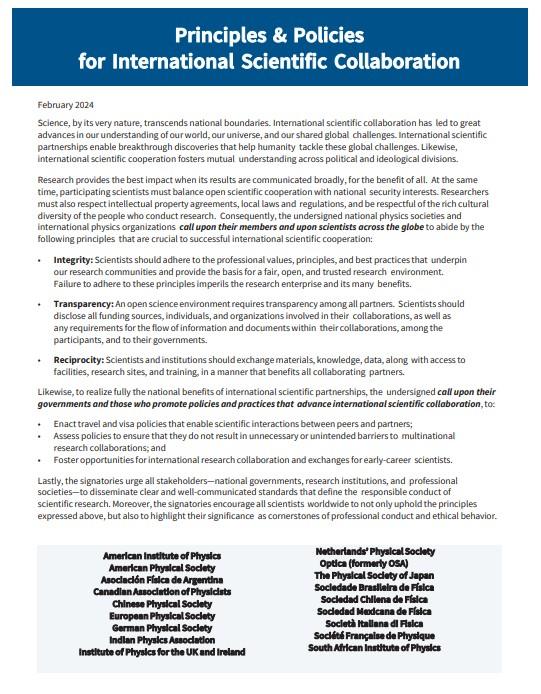
Principles & Policies
for International Scientific Collaboration
February 2024
Science, by its very nature, transcends national boundaries. International scientific collaboration has led to great advances in our understanding of our world, our universe, and our shared global challenges. International scientific partnerships enable breakthrough discoveries that help humanity tackle these global challenges. Likewise, international scientific cooperation fosters mutual understanding across political and ideological divisions.
Research provides the best impact when its results are communicated broadly, for the benefit of all. At the same time, participating scientists must balance open scientific cooperation with national security interests. Researchers must also respect intellectual property agreements, local laws and regulations, and be respectful of the rich cultural diversity of the people who conduct research. Consequently, the undersigned national physics societies and international physics organizations call upon their members and upon scientists across the globe to abide by the following principles that are crucial to successful international scientific cooperation:
* Integrity: Scientists should adhere to the professional values, principles, and best practices that underpin our research communities and provide the basis for a fair, open, and trusted research environment. Failure to adhere to these principles imperils the research enterprise and its many benefits.
* Transparency: An open science environment requires transparency among all partners. Scientists should disclose all funding sources, individuals, and organizations involved in their collaborations, as well as any requirements for the flow of information and documents within their collaborations, among the participants, and to their governments.
* Reciprocity: Scientists and institutions should exchange materials, knowledge, data, along with access to facilities, research sites, and training, in a manner that benefits all collaborating partners.
Likewise, to realize fully the national benefits of international scientific partnerships, the undersigned call upon their governments and those who promote policies and practices that advance international scientific collaboration, to:
* Enact travel and visa policies that enable scientific interactions between peers and partners;
* Assess policies to ensure that they do not result in unnecessary or unintended barriers to multinational research collaborations;
* Foster opportunities for international research collaboration and exchanges for early-career scientists.
Lastly, the signatories urge all stakeholders—national governments, research institutions, and professional societies—to disseminate clear and well-communicated standards that define the responsible conduct of scientific research. Moreover, the signatories encourage all scientists worldwide to not only uphold the principles expressed above, but also to highlight their significance as cornerstones of professional conduct and ethical behavior.American Institute of Physics Netherlands’Physical Society
American Physical Society Optica (formerly OSA)
Asociación Física de Argentina The Physical Society of Japan
Canadian Association of Physicists Sociedade Brasileira de Física
Chinese Physical Society Sociedad Chilena de Física
European Physical Society Sociedad Mexicana de Física
German Physical Society Società Italiana di Fisica
Indian Physics Association Société Française de Physique
Institute of Physics for the UK and Ireland South African Institute of Physics
American Physical Society Optica (formerly OSA)
Asociación Física de Argentina The Physical Society of Japan
Canadian Association of Physicists Sociedade Brasileira de Física
Chinese Physical Society Sociedad Chilena de Física
European Physical Society Sociedad Mexicana de Física
German Physical Society Società Italiana di Fisica
Indian Physics Association Société Française de Physique
Institute of Physics for the UK and Ireland South African Institute of Physics
编者按:
这是一份由各国物理学会和国际物理组织签署的关于国际科学合作原则和政策的声明。该声明强调了国际科学合作在推动我们对世界、宇宙和全球挑战的理解方面的重要性。它还强调了科学合作中诚信、透明度和互惠性的需要,以及尊重国家安全利益、知识产权协议、当地法律和文化多样性的重要性。
该声明还呼吁政府和决策者制定旅行和签证政策,以促进科学交流,评估政策以防止对跨国研究合作造成不必要的障碍,并促进早期科学家的国际研究合作和交流机会。
总的来说,该文件强调了科学研究中道德行为和负责任行为的重要性,并鼓励所有利益相关方遵守和推广这些原则。
这是一份由各国物理学会和国际物理组织签署的关于国际科学合作原则和政策的声明。该声明强调了国际科学合作在推动我们对世界、宇宙和全球挑战的理解方面的重要性。它还强调了科学合作中诚信、透明度和互惠性的需要,以及尊重国家安全利益、知识产权协议、当地法律和文化多样性的重要性。
该声明还呼吁政府和决策者制定旅行和签证政策,以促进科学交流,评估政策以防止对跨国研究合作造成不必要的障碍,并促进早期科学家的国际研究合作和交流机会。
总的来说,该文件强调了科学研究中道德行为和负责任行为的重要性,并鼓励所有利益相关方遵守和推广这些原则。
《国际科学合作的原则与政策》
2024年2月
科学本质上超越了国界。国际科学合作在增进我们对世界、宇宙和共同全球挑战的理解方面取得了巨大进展。国际科学合作使突破性发现成为可能,有助于人类应对全球挑战。同样,国际科学合作促进了跨越政治和意识形态分歧的相互理解。
研究成果通过广泛传播能够产生最大影响,造福所有人。同时,参与研究的科学家必须在开放的科学合作与国家安全利益之间取得平衡。研究人员还必须尊重知识产权协议、当地法律法规,并尊重从事研究工作的人们丰富的文化多样性。因此,签署本文件的国家物理学会和国际物理组织呼吁他们的成员以及全球科学家遵守以下对于成功的国际科学合作至关重要的原则:
• 诚信:科学家应遵守支撑我们研究社区的专业价值观、原则和最佳实践,为公平、开放和值得信赖的研究环境奠定基础。不遵守这些原则将危及研究事业及其诸多益处。
• 透明度:开放的科学环境需要所有合作伙伴之间的透明度。科学家应披露所有资助来源,涉及他们合作的个人和组织,以及他们合作中信息和文件流动的任何要求,以及向参与者和各自政府提供信息的要求。
• 互惠性:科学家和机构应以有利于所有合作伙伴的方式交换材料、知识、数据,以及获取设施、研究场所和培训的机会。
同样,为了充分实现国际科学合作的国家利益,签署方呼吁他们的政府和那些提倡促进国际科学合作的政策和实践者:
• 制定旅行和签证政策,以促进同行和合作伙伴之间的科学交流;
• 评估政策,以确保它们不会导致多国研究合作中的不必要或意外的障碍;
• 促进早期科学家的国际研究合作和交流机会。
最后,签署方敦促所有利益相关方——国家政府、研究机构和专业学会——传播明确和清晰的标准,界定科学研究的负责任行为。此外,签署方鼓励全球科学家不仅遵守上述原则,还强调这些原则作为专业 行为和道德行为的基石的重要性。
此份关于国际科学合作原则和政策的声明由美国物理联合会、美国物理学会、阿根廷物理学会、加拿大物理学家协会、中国物理学会、欧洲物理学会、德国物理学会、印度物理协会、英国和爱尔兰物理学会、荷兰物理学会、美国光学会(前身为OSA)、日本物理学会、巴西物理学会、智利物理学会、墨西哥物理学会、意大利物理学会、法国物理学会、南非物理学会等国家和国际物理组织共同签署。
高能物理研究所文献信息中心 江亚欧 译注
